
Salomé Tupa took a sip of hot coffee, hoping it would help her cope with the suffocating heat, as she listened intently to her colleague Patricia Guzmán, who was delivering the welcome remarks at an event for rice researchers. It was the opening session of the technical committee meeting and rice selection workshop for the tropics, held by the Latin American Fund for Irrigated Rice (FLAR) with representatives of its member organizations, at Colombia’s National Rice Growers’ Federation (Fedearroz) in Villavicencio. Along with Ms. Tupa and Ms. Guzmán, plant breeders and researchers from all over Latin America came in search of the best rice varieties for further testing in their home countries.
The making of a Colombian comeback
Addressing an audience of more than 50 scientists, Ms. Guzmán emphasized the importance of improved production technologies, easier access to credit for farmers, and more training for technicians. She spoke with the confidence that her 25 years of work in the rice sector have given her and with the responsibility that comes with being the technical manager for Colombia’s principal rice growers’ association.
Ms. Guzmán’s words were clear and convincing. After the session, she retired to a provisional office; her permanent workplace is in Bogotá, 115 kilometers from Villavicencio. She answered emails, accepted invitations to give more presentations, arranged a meeting with her boss, and organized visits to various Fedearroz experiment stations and farmers’ fields for followup on her organization’s new flagship initiative—Amtec—the Spanish acronym for a name that means “massive technology adoption.”
Ms. Guzmán studied agronomy at the University of Tolima and earned her master’s degree in agricultural science, with emphasis on plant pathology, from the National University. Her work with Fedearroz started in 1989. For 15 years, her job was to combat disease problems through research and technology transfer. Later, she took up the challenge of managing a business,Central de Granos de Coclé (Coclé Grain Central), in Panama. But, like “the good child” of a traditional Colombian saying, Patricia eventually came home, returning to Fedearroz in January 2011 as technical manager, the first woman to occupy this post in the organization’s 70-year history.
Ms. Guzmán readily admits that these have been tough times. Over the past 5 years, Colombia’s average rice yield has dropped by 1 ton per hectare, from 6.2 to 5.3 tons (although 2014 saw a slight increase in productivity). Part of the problem is the rice sector’s vulnerability to the effects of climate change.
In the face of this challenge, Ms. Guzmán has shown leadership, visiting other rice-producing countries, building alliances with international and national organizations, and working closely with the Colombian government to find ways of lowering production costs and raising yields on around 438,000 hectares sown to rice in this country.
“Our goal is to first achieve national self-sufficiency in rice and then within 8 years be ready to penetrate international markets,” said Ms. Guzmán. To this end, she’ll keep working with Colombia’s rice growers in their fields, because “that’s where the problems are and also the solutions.”
Breathing new life into a Bolivian rice growers’ association

The technical discussions in Villavicencio lasted 2 days giving rice researchers a good overview of recent advances in genetic improvement for Latin America. Over the next 3 days theory gave way to practice as the Santa Rosa experiment station, where the workshop was held, became an epicenter for the selection of elite rice lines.
That’s when Ms. Tupa came to life. She didn’t care anymore about the 30-degree heat; as the sky cleared, she immersed herself in the rice fields and began feeling right at home.
Accompanied by her colleague James Cabrera, Ms. Tupa made the rounds of the experimental plots. Her mission: to identify rice varieties that might give good results on Bolivian soil. Like Ms. Guzmán, she went about this task with the assurance gained from 25 years of working in the rice sector and also with the responsibility that comes with leading Bolivia’s most important rice growers’ organization, the National Association of Rice Cooperatives (Fenca).
Before taking up her current post, and while still working in support of Fenca’s technical management, Ms. Tupa was invited to visit South Korea. During her 21-day trip, she had a close-up look at the extraordinary experience of Korean rice growers. This encouraged her to accept the offer of a new leadership role in her own country’s struggling rice sector.
The immediate challenge was getting the nearly extinct association back on its feet. The year 2012 was the most difficult in Fenca’s 50-year history. Of the 60 cooperatives that originally made up the association, only 10 remained. In a race against time, Ms. Tupa began to organize events; to build strategic alliances with public and private sector organizations, both locally and abroad; and to show Fenca members, both former ones and those remaining, that the association was by no means a lost cause. One of her main projects, as the first woman to lead Fenca, is to train member cooperatives in the six steps that make up FLAR’s initiative on improved crop management for higher yields.
“The rice sector had to either transform itself or die,” says Ms. Tupa, who was born in the city of Potosí but grew up in Santa Cruz de la Sierra, where she earned a bachelor’s degree in agriculture at the Bolivian Evangelical University. “We couldn’t keep on making the same mistakes. We had to learn more about new technology for precision crop management, about options for helping farmers obtain credit, and about working as a team to move ahead.”
Ms. Tupa inherited her commitment to rice production from her parents; farming is in her blood. That’s why, in addition to leading Fenca, she also finds time to tend to her own 50-hectare farm, which she sows to upland rice. Her husband and two small children claim their share of her time as well. But she’ll keep working to regain credibility and confidence among the cooperatives that have said goodbye to Fenca.
Delivering on the promise of women’s leadership
These are the challenges and achievements of Patricia Guzmán and Salomé Tupa. While living and working on distant lands, they are united by a shared commitment: to deliver on the promise of women’s hard-won leadership in Latin America’s traditionally male-dominated rice sector.
_________________________________________
Ms. Varón Molina is communications coordinator for Latin America and the Caribbean at CIAT.


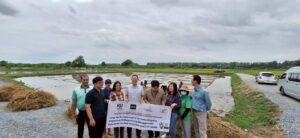
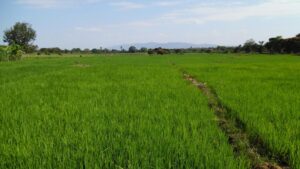
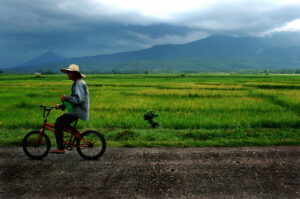
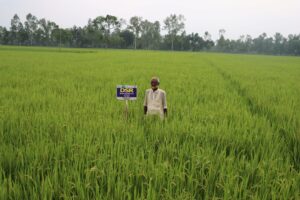
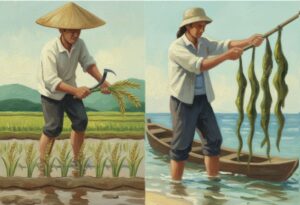


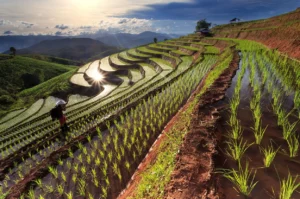
Great point about grandmothers. I too, watechd late-night TV (for a kid) with grandma, including the Sunday Night Movie / Movie of the Week / in the 70s-80s. We didn’t watch V together, but after hearing this podcast, I realize how unique (and now un-re-peatable) the mini-series style of TV was to the U.S. viewer back then. Sometimes, I wish for the days when there were less TV options (not more) because back then, we were all in the same bucket, and could share the same collective memories.